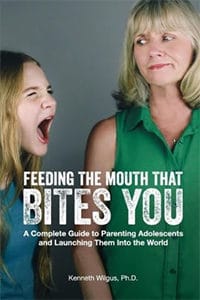John Fuller: Today on Focus on the Family, we’ll examine that inevitable day in the life of every parent when childhood ends and your young adult is ready to begin life on their own. And hopefully your transition won’t go like this.
Daughter: Dad, we need to talk.
Dad: Sure, honey. What’s up? Wanna use the car? Need a few bucks? I, I could-
Daughter: No, no, (laughs) listen, dad. I really think the time has come for me to move out of the house.
Dad: Honey, uh, why? This is so sudden.
Daughter: Dad, I’m 35 years old.
Dad: W- what? All 35-year-old girls need to move out of their parents’ houses? I thought you liked it here. I’d miss my little girl.
Daughter: I’m not your little girl anymore, dad. I’ve been married for seven years.
Dad: I know, I know. And we love Bob.
Daughter: Bill.
Dad: Bill. Your mother and I think the world of Bill. Don’t we think the world of Bill, honey?
Mother: Bill who?
Daughter: Listen Dad, I’m getting older. It’s time that I led my own life, to give my family and I identity of its own.
Dad: Why?
John: As ridiculous as that sounds, parents of teens often experience some tension as the high school graduation looms. And you may be wondering, “Is my son or my daughter ready? Will they launch? Will they launch well?” We’re gonna address those issues and more today on our program. And your host is Focus president and author, Jim Daly. I’m John Fuller.
Jim Daly: John, I think way down deep we don’t think they’re ever ready, right? (laughs)
John: (laughs) If we’re really truthful. Yeah.
Jim: Uh, but we did feature an excellent conversation last time with Dr. Ken Wilgus. He’s a psychologist who has a lot of expertise in this area of adolescent behavior. In fact, uh, Jean and I contacted him when we were struggling with something with one of the boys. Uh, he has described a novel approach to some of the common challenges that parents, and teens can face during that transition period. I would say he’s the expert.
John: Mm-hmm.
Jim: Bottom line is, it’s so good to think about this topic before it hits you, right? Especially if your kids are just stepping into their teen years. Uh, you want to prepare now so that transition can go more smoothly later. And we’ve got more great advice from Dr. Ken on today’s program.
John: And if you missed the show last time, get an audio downloaded of the conversation or check out the previous episode on YouTube or Spotify or our app. And, uh, we mentioned that Dr. Wilgus has a book, it’s called Feeding The Mouth That Bites You: A Complete Guide to Parenting Adolescents and Launching Them into the World. Learn more about that and our guest, when you call 800-A-FAMILY, or stop by focusonthefamily.com/broadcast. And here’s Jim now with part two of our conversation, uh, with Dr. Ken Wilgus on Focus on the Family.
Jim: Ken, welcome back.
Dr. Ken Wilgus: Hey, thanks.
Jim: Okay, I’m serious. You’re an expert in adolescents, you can actually attain expert hood in, uh, teenagers. (laughs)
Dr. Wilgus: There is such a thing. Yes, there is.
Jim: That’s the position of envy for all parents.
Dr. Wilgus: Yeah.
Jim: You really understand how these young people think?
Dr. Wilgus: You know, I actually tried to get away from-
Jim: (laughs)
Dr. Wilgus: … the world of adolescents when I started, but there was just a logic to it that I couldn’t ignore.
Jim: Let me ask you that. You know, often I think, “Why did my dentist want to become a dentist?” (laughs) Why did you want to do this?
Dr. Wilgus: Well, I was trying to work with adults, but when you’re a male in psychology training, like in Chicago, I worked at Michael Reese Medical Center and, uh, if they had, they had an intensive adolescent unit, and man, you gotta have a guy in that unit cause it can be intense. So I ended up getting thrown in there. This is how the Lord works. You know, I’m complaining that, “Oh no, that’s not what I want to do.” But I remember sitting in group with parents that would, you know, be essentially, uh, patronizing their teenagers and talking to them. And I could just tell that this was really hard on that teenager. So it turned out I had an ear for it. Essentially, I never really quite grew up from my own adolescence, I suppose.
Jim: So if you, you know, coming off of what we talked about last time, and we’ve said it already two or three times, if you missed it, get it because the content was so good. If you’re looking at one silver bullet, I know this is a very unfair question, but for the parent that has been, as you described last time, that typical Christian parent, very engaged, very parental maybe up until 16, 17, 18 years old, where decisions were really with you and not with that, uh, growing adolescent. What is something I could do to reverse course to say, “Okay, I have blown it. What I heard today on Focus on the Family really challenges me because I’ve been so over-engaged, so decision oriented for my 17-year-old, what can I do?”
Dr. Wilgus: Okay. That is an unfair question, but-
Jim: (laughs)
Dr. Wilgus: … I do think that, that’s, again, it starts with our faith, knowing that we don’t blow stuff. Jesus is never going, “Oh no, this is too much of a mess for me now.” So I think starting with that kind of conversation, but it is a conversation with your teenager, and I would think the conversation needs to be about your own fear as a parent, yet what you had tried to do, but really taking responsibility for the possibility that, “What we’ve communicated to you as our son or as our daughter, that we might have ended up communicating that we don’t respect your own ability to do stuff. And if we’ve done that, we really want to let you know we’re sorry about that.” Make sure you let them know that you’ve prayed about this and that’s why you feel the freedom to tell them that. Because again, teenagers are all eyes and ears, and they can tell that what we teach about our faith, whether it really impacts our behavior or not. And nothing teaches teenagers that the Christian faith is not real quite like a parent that is freaking out-
Jim: Yeah.
Dr. Wilgus: … over everything that they do.
Jim: Is it ever too late for the restart button? I mean, if they’re 23, 24? I mean-
Dr. Wilgus: No, I don’t think so. I think, again, if you count the restart button as, “Let’s talk about what I may have signaled to you as disrespect.”
Jim: Yeah.
Dr. Wilgus: Because you can definitely, I know adults that are, you know, 50s and they with their own adult parents that are still trying to-
Jim: Yeah.
Dr. Wilgus: … teach and control and manage, and that can be tense. So there’s, it’s never too late for that conversation.
Jim: Well, and the interesting thing is healing that relationship is what God would want.
Dr. Wilgus: Oh, absolutely.
Jim: And that’s fundamentally whether your child is 30 or 40. If you haven’t had that healing in that relationship, that is what the Lord’s after-
Dr. Wilgus: That’s exactly right.
Jim: … that you have that good communication. Um, we did talk about emancipation, how to emancipate your teen. We got into that right at the end of the program last time. Let’s pick it up there. Uh, you introduced us to that concept of planned emancipation. Uh, you described it as a strategy where parents can, um, help their teenagers, right around starting at age 13 or so, to make the transition from childhood to adulthood. Uh, for those who missed, uh, the conversation, give us that quick summary of planned emancipation, how it works.
Dr. Wilgus: Plan emancipation is getting ahead of the adolescent’s primary need. You need to know when and how you’re gonna arrive as an adult. And here’s the answer to that. And it is a parent’s basically roadmap from wherever you start to the end, which for the vast majority of parents, the end is the end of high school, pretty much. Uh, you need to be prepared for them to pretty much be making their own decisions by the time they finished high school.
Jim: Yeah.
Dr. Wilgus: But the step to do that is I, I suggest you make a freedoms list, which is actually on a sheet of paper. Left-hand side is a list of freedoms that not privilege. “We’ll let you stay out a little later. We’ll let you…” It’s freedoms, that say, “Um, we think you should use your own judgment in the following areas.” And there’s a, on the left side of the paper should be freedoms. Like in our house at 13, you got the freedom to, uh, listen to whatever music you felt you needed to. Uh, you could keep your own room as clean or dirty as you see fit. That always freaks mothers out. I’ve gotten literally photos of, “Do you mean this room?” You know, so you know, so-
Jim: Well, and so if they choose to have it dirty, is that okay?
Dr. Wilgus: Well, again, it comes down to, uh, with freedom always comes responsibility and responsibility means, “And here’s the washer, here’s the dryer. You don’t want us wandering in taking care of your clothes for you.” And then otherwise you handle it like you would an apartment. Like, “If there’s a smell coming outta your room, you’re gonna have to do something about that and pay for that. And, um, if there’s, uh, food in your uh, room, you can have that as long as you can afford an exterminator. But if you can’t, we’re gonna fine you for any…” So basically there’s a big difference-
Jim: Fine? I like this. Now we’re gonna get direction.
Dr. Wilgus: … uh, you know. It costs you money. Um, and, and-
Jim: 20 bucks.
Dr. Wilgus: … with freedom, uh, that may be high. I don’t know. It depends on kind of how you wanna do it.
Jim: (laughs)
Dr. Wilgus: I did have a couple whose son makes quite a bit of money and they’re charging 10 bucks for a cup or a glass, so depends on your-
Jim: A cup or a glass?
Dr. Wilgus: Everything left in the room, absolutely.
Jim: I’m starting to like this emancipation.
John: And the money. (laughs)
Dr. Wilgus: See, see, it, it scares me that you get all excited about the restrictive part.
Jim: Well, I’m just thinking of how many dirty dishes are around the house and-
Dr. Wilgus: Well, there’s a big difference between saying that, “Your freedom, we want you to have freedom,” versus, “Uh, your freedom shouldn’t mess with us. It should not cause us a problem.”
Jim: I, yeah. I might be able to make 200 bucks tonight. (laughs)
John: What’s the balance there, Ken, between your freedom as a teen and my, um, home and your responsibility in that?
Dr. Wilgus: Well, most teenagers understand that, for example, the difference between saying, “You can’t keep your room this way because cleanliness is next to godliness.” They’re tired of hearing that. Besides, I’ve looked it up in the dictionary and goggles is next to godliness. It’s not actually cleanliness.
Jim: (laughs)
Dr. Wilgus: But, um, secondly to say, “But listen, you’re, we don’t wanna mess with you, but this or that thing in your room is causing us problems, like the bugs, perhaps, all that.”
Jim: Mm-hmm.
Dr. Wilgus: Most teenagers get that and they’re much more willing to cooperate or at least understand that, but that doesn’t mean they’ll always do it. And then you get to the next part, which is setting, uh, expectations and restrictions. And parents really should not have, uh, hesitation in pulling the strings they need to, to expect, uh, the minimum respect that you need to give us.
Jim: Mm-hmm.
Dr. Wilgus: Which in this case is, uh, fine if you, uh, refuse to, you know, follow the rule about food in your room, things like that.
Jim: So that’s all laid out so it’s understood.
Dr. Wilgus: It’s all laid out.
Jim: I love these concepts in your book, Feeding The Mouth That Bites You, you lay these out. So well, let me go a little deeper philosophically, because you talk about the importance that parents need to understand this idea to trade control for influence.
Dr. Wilgus: Yes.
Jim: Okay. That’s a panic button for many parents.
Dr. Wilgus: Mm-hmm.
Jim: You know, “Control is the tool I have, Dr. Ken.”
Dr. Wilgus: That’s right. Again, it’s a matter of recognizing that from 13 to the end of high school, you are having, whether you want to or not, you are having less and less control. And it’s a matter of recognizing it. I, it’s really embarrassing to sit in an office with a teenager and their parent who proudly announces that, “Well, in our house, you know, we keep track, we know what she’s doing, where she’s going.” She looks at me and I look at her cause just last week, she and I talked about a number of things her parents don’t know about. So they just look silly to pretend like I have a kind of control that I really don’t have.
Jim: Yeah.
Dr. Wilgus: So it’s really not giving up as much as you think to acknowledge that freedom for what is, again, so commonly not there, which is real influence.
Jim: Yeah.
Dr. Wilgus: A relational communication influence that says, “Listen, I’m, I’m not here to tell you how to keep your room anymore, but can I just ask you, this is really depressing in here.” Which is almost a conversation I had with my son one time who asked me twice. This is Mr. ADD Boy who really, he’s living in regular life. (laughs) We do hard-
Jim: (laughs)
Dr. Wilgus: We do hard launches in our family. They’re gone. Um, but my son and his wife and their two kids, uh, you know, there was some points where his room got pretty bad and twice he asked me, “Could you come help me clean my room?” So I was like, “Sure.” Now in all fairness, it lasted about 15 minutes. He got too ashamed with my questions of, “How long have you had this out here?” He was like, “Nevermind, nevermind.” So we stopped. But you know, he had much more ability to talk to me about that than he would have if we had done that usual yelling thing that goes on for years-
Jim: Mm-hmm.
Dr. Wilgus: … just to try to get a clean room. And then if you visit any freshman dorm in this country, you’ll see that, um, you know that it’s not exactly working.
Jim: Right. I know. But the irony is we keep coming back to the same methodology.
Dr. Wilgus: Yeah, exactly. Which is the most common problem of parents using childhood parenting techniques with teenagers, and it just doesn’t work.
Jim: Uh, Ken, in your book you mention the need for teenagers to feel grown up. Uh, but it’s a desperate need is the word you used actually.
Dr. Wilgus: Yeah.
Jim: I don’t think parents connect with this. What is this desperate need to feel grown up and then how does that express itself in unhealthy ways and then in healthy ways?
Dr. Wilgus: Well, that’s a good question because the primary need of teenagers is what we call in individuation, which is essentially do the people that I know see that I’m grown up. Are they, um, am I going to arrive at adulthood? And if they’re not getting it in healthy ways from their parents, then it’s very common for teenagers to seek it in unhealthy ways. For example, one of the most common answers to the question of teenagers, “Why do you drink alcohol?” Is, “To feel grown up,” is part of that. So teenagers will go and do the thing that seems grown up as if pouring alcohol down your throat makes you somehow an adult. But it at least has that feel to it because again, in some cases, overprotected teenagers feel like I need some way to feel that adultness. And what we wanna provide as parents is that ability that, “You can grow up here in our house. You don’t have to just get away.”
Jim: And that takes, um, you know, fortitude and thinking that through in terms of the paces. I’m reminded of, so often you talk about the pastor’s kids, the pastor’s daughter, the pastor’s son. They oftentimes can be those kids that are doing those destructive behaviors, uh, disproportionately true to others. Explain why. And I think this fits in with this area of identity.
Dr. Wilgus: I think you’re right.
Jim: Because they’re seen, they’re kind of in this fishbowl.
Dr. Wilgus: This fishbowl. And I’ve talked with a lot of pastors kids about that very thing, that it’s extra difficult for a pastor because of what can be seen as the expectations of everyone else that they expect this, uh, pastor child, no matter what the age to be a sort of goody goodie essentially. And, um, there’s nothing wrong with choosing moral good behavior unless that seems to, um, advertise that, “I can’t think things through and I’m really about a six-year-old, even though I’m 17,” or whatever. So it’s critical that they be given the kind of, uh, messages particularly, uh, from their parents that despite what you may think other people are looking at in the church, we want you to own more and more of your own life. And it can be hard. A lot of times you have to push back against again, since it’s a cultural confusion, you can hear really well-meaning people say, “Well, but shouldn’t, uh, if they’re not ready after that senior year, maybe you should keep ’em home for a year,” as if you can keep ’em home for a year.
Jim: Right.
Dr. Wilgus: Or if that’s gonna be somehow good for them. So you have to push back even against well-meaning people giving you advice.
Jim: Well, and I think that’s the underlying issue here, and you’ve hit it well in Feeding The Mouth That Bites You, is that relinquishing of your fear and your control. It seems counterintuitive-
Dr. Wilgus: Yeah, it does.
Jim: … because you wanna protect, you want… They’re not ready yet. (laughs) You know, just like the opening, you know, 35 and still at home.
Dr. Wilgus: I love that.
Jim: Um, and some parents, I’m afraid to say, might find that comforting to them. So we’re actually using that relationship to soothe our own fears.
Dr. Wilgus: And I wanna be real clear. I mean, fear is part of the air that I live and breathe. I mean, I’m, it’s hard, I don’t expect parents to not be fearful.
Jim: Right?
Dr. Wilgus: But what I think-
Jim: It’s natural.
Dr. Wilgus: …. it’s hard, is that it can be sometimes lifted up as almost a virtue that, um, a parent that is letting go is the one that really doesn’t care as much or, or isn’t informed. If you knew what I knew about the suicide rate, you wouldn’t allow these, whatever.
Jim: Right.
Dr. Wilgus: That, that, so fear masquerades as, uh, authority as, uh, some more, uh, passionate and that’s the part that I think has to be pushed back against.
Jim: Yeah. Y- you say that teens want freedom, but they also want their parents to give them that freedom.
Dr. Wilgus: That’s right.
Jim: Why is that distinction so important for us?
Dr. Wilgus: I always remember, we had an adolescent day hospital. There was a, and we’re having a group therapy of teenagers, which you can imagine is filled with a lot of, “My parents don’t get what I’m going… They don’t let me,” you know. And there was this one really depressed girl, I think she was about 15. And um, she finally looked up and she said, you know, “I have everything you guys wish for. Um, I wish someone would ask if I’m coming in at night.” But her family had pretty much exploded. There was not, uh-
Jim: So she desired it.
Dr. Wilgus: … uh, it’s a divorce. She had the freedom, but she did not have the message from someone who cared, “It’s time for you to have this freedom.”
Jim: Yeah.
Dr. Wilgus: And it’s really important because parents will say, “Hey, we, Dr. Wilgus, we do fine until we say no. He just wants us to leave him alone.” That’s not exactly true.
Jim: Mm-hmm.
Dr. Wilgus: Um, what she wants to hear is, “Why are you still telling me what movie to go to? Why are you telling, telling me when to come in, what parties to go to?” All those things. They want to hear from their parent, “Hey, it’s now time, you’re 37, it’s time,” you know, whatever the point that you can really give that real answer, that, “It’s time for you to make that decision yourself.”
John: Mm-hmm. And that can be challenging for us as moms and dads knowing when to let go of those decisions. Today on Focus on the Family, we’re hearing from Dr. Ken Wilgus about giving your teen more control over his or her life. And the basis for the conversation is a book called Feeding The Mouth That Bites You. We’ll recommend you get a copy of that along with the CD or a free download of the two-day conversation at focusonthefamily.com/broadcast.
Jim: Talk about communication challenges with your teens. This seems to be the one in our household. I don’t know if you’ve struggled with this, John. It’s like, “Hey, did you have a great day at school?” “Yeah.” “Hey, what do you want for dinner?” “Eh, anything.” (laughs)
Dr. Wilgus: Which can happen overnight. It’s like, “I thought we were talking just last week, and now…”
Jim: Yeah. It used to be, you know, Q and A all the time. “Hey, look at that dog, dad. Isn’t that a cute dog? I’d like a dog like that, dad. Can I take a that dog home, dad?”
Dr. Wilgus: No, that was years ago.
Jim: (laughs) To where, “You want a dog?” “Yeah.” “Okay.”
Dr. Wilgus: Most of the time-
Jim: So what’s, what’s happening there with communication?
Dr. Wilgus: Most of the time, most of the time it’s a control battle. You have a young adult-
Jim: Mm-hmm.
Dr. Wilgus: … who feels like instead of your questions being good natured, you’re a cop-
Jim: (laughs)
Dr. Wilgus: … asking, “How was your day? Let me just check and see if there’s anything I need to intervene.”
Jim: That’s so true.
Dr. Wilgus: And check in. And so unless you make that really clear, like, “Why am I asking this? Uh, what are my purposes?” Which is really about planned emancipation, stepping back and saying, “Listen, at your age, you don’t really have to talk to me about these things. I miss us talking together and I’d like to know, but you don’t have to answer all these things if you don’t want to,” can very often, pretty quickly open up a lot more communication.
Jim: So you’re saying too in the book that teenagers really want to communicate. It doesn’t feel that way for a parent so often.
Dr. Wilgus: It’s really true, and if being a psychologist is a rare opportunity to get to talk to teenagers, when you can really be open, and it’s not unusual, uh, for parents to assume that their teenager does not want to. They really do if they can trust what they say to their parents.
Jim: Well, and that’s the key question. How do you create that bedrock of trust that it’s not gonna be the lecture, it’s not gonna be the ticket from the policeman, it’s gonna be a conversation. And then how, what kind of triggers do you use as a parent not to fall into that trap of the lecture?
Dr. Wilgus: Well, I think that’s a hard task. I think it starts by really recognizing you have a young adult. It’s really recognizing that they are thinking for themselves, and sometimes it means taking ownership of what you’ve done before and recognizing that, “Listen, I’m sorry, yesterday I blew up again just because you said that you didn’t do well on a test. I’m really trying to back off from that. That’s not about you,” that’s about me taking ownership of that and then pursuing forward with really, uh, what the teenager really is wanting to talk about and really listening to what are the things that are important to your teenager and trying to process that with them.
Jim: Mm-hmm.
Dr. Wilgus: And so taking ownership is important, but also respecting and recognizing the, uh, stage of development that your teenager is in.
John: Mm-hmm. It’s really important for parents to recognize when they’re having those little dialogues, A, not to take things personally, and then, B, to realize, um, that a nonjudgmental reply can kind of be a key to unlock further conversation. W- work through a script with me, what that might look like.
Dr. Wilgus: You have to practically practice it sometimes with friends or, or your spouse to-
Jim: (laughs)
Dr. Wilgus: Uh, it can feel like bad parenting for a teenager to say something that you don’t think is a very good idea. But to really simply just talk to them about it so it sounds like that kind of thing is important to you guys. You like that sort of say music that you really don’t think is a good idea and really processing with them as an adult. Not because what they’re doing is right, but because you really want to talk to them like you would a friend. It is the most common, even with adults, older adults, parents that are still little, uh, lecture machines that you, you drop a topic in and they’ll say, “Ah, music, you see I and-”
Jim: Yeah.
Dr. Wilgus: … and they’re off on their little thing. And there’s no conversation there.
Jim: You’re kind of hitting where it’s real sensitive here, Ken.
Dr. Wilgus: Yeah, I, I was told you don’t do that.
Jim: (laughs) I probably do more of it than I realize, actually.
Dr. Wilgus: I did.
Jim: You know, uh, one thing that people need to walk away with is this idea to agree to disagree, especially for teenagers with their parents, because again, parents, especially Christian parents, we want this alignment. We really value alignment.
Dr. Wilgus: That’s right.
Jim: Our house… We even have rules, you know, our household believes… So if you don’t believe that rule, you’re not part of the household. That’s what we communicate. And, uh, why do we need to develop that ability to agree to disagree, especially as a parent with a teenager and vice versa?
Dr. Wilgus: Because families that are really close, especially have the hardest time with this. Because in the past we’ve had, as you mentioned kind of group think. We are all sort of… It’s great that we all kind of like the same things, we’re about the same things, and we’re used to being able to talk to this one child or more that doesn’t seem to quite get it. We explain and then they’re back in line. By the time they become an adolescent, nothing’s bad has happened, but they’ve changed. Formal operational thought is actually a real thing in cognitive development where teenagers can and need to think for themselves.
Jim: Yeah.
Dr. Wilgus: And the goal of learning to agree to disagree is critical in being able to really process through where you differ, uh, where we differ, and so that you can avoid what is very often some pretty severe, uh, arguments that simply start with the goal of, “Wait, honey, I don’t think you understand. Let me repeat this thing again. Let me show you an article. Let me just this thing…” And the next thing you know, you’re a normal parent and you are screaming, uh, or almost literally getting physical because you’re scared to death that, “I can’t seem to get this point across like we always used to.”
Jim: Yeah.
Dr. Wilgus: And it’s simply a matter of learning that, “It’s okay. We need to agree to disagree.”
Jim: You and your son had a good example of this. What happened with your son?
Dr. Wilgus: Well, it was actually the point that I really knew he was a teenager and this is what’s so rough.
Jim: (laughs)
Dr. Wilgus: You know, it’s hard on my… My children have worked out. Well, they’re good kids, but I’ll be honest, they were not bad kids to start with. They were not that hard, but my son was 13 and he went to mow the lawn and uh, he came in done. And I said, “Well, no, there’s this other part back there that I told you you need to do also.” He said, “No, you didn’t tell me that.” I said, “Yeah, I did.” And so he, you know, he is a decent kid, he walked out. But instead of going to get on the mower, I looked out the window and he is pacing and talking to himself. And he comes back in. He never done this before. He said, “Dad, you did not tell me to do that. We agreed upon…” And I, and I remember suddenly realizing that I can’t talk him into stuff like I used to.
Jim: (laughs) Right.
Dr. Wilgus: This is the weird part. And I realized that. I said, “We’re just gonna have to agree to disagree.” And this is what’s so weird about being a shrink. I started to choke up because I got tearful cause I knew this is my adolescent. He’s my oldest. So now we’re in adolescent stage. Well, you can imagine my kid is going, “You okay dad? Is there something-
Jim: “I’ll, I’ll mow it, I’ll mow it. What is your problem?” (laughs)
John: “It’s just the lawn. Come on.” (laughs)
Jim: That critical.
Dr. Wilgus: It’s, it’s, it’s… You need to pray for my poor kids. But, but it was a real moment of recognition that, you know, his thinking had changed and he really could think for himself, and he fully, his experience was way different from mine and I needed to accept that. Even though, the end of the story is I did say, “Look, I think I told you, and if you don’t, there’ll be this consequence for it.” So it didn’t work out great for him, but we didn’t get into a big argument either.
Jim: Yeah, Ken, I’m thinking of the parent that has the 24, 25-year-old, and uh, in that case they did over manage. It didn’t go well. It kind of that Josh McDowell statement, uh, you know, rules without relationship-
Dr. Wilgus: Equals rebellion.
Jim: … end in rebellion.
Dr. Wilgus: Yeah.
Jim: And that’s been the story in this hypothetical case that I’m painting. How does a parent reach back to that adult child now and say, “Hey, we’ve got some things we gotta talk about.” What can they do that makes it real, makes it beneficial, doesn’t turn into another lecture opportunity.
Dr. Wilgus: That’s a great question and this may surprise you, but if reaching out to that 24 year old means walking down to your own basement and getting them out of there, cause that’s where they are, then there’s a first step that needs to be taken anyway, which is you need to set a point where you’re gonna let ’em know, “This is it. You’re gonna be out of here, not in immediately.” But you need to set a point where you let them know it’s respectful to let a young adult know that, “You’re not welcome to live here, no, you know, without, uh, limits.”
Um, but outside of that, then I think the other part is to address that, you know, “And we’re worried that we have given you the wrong message, that what we’ve tried to be as loving and caring. But I think we’ve communicated that we don’t respect your ability to make your own decisions about things-”
Jim: Mm-hmm.
Dr. Wilgus: … and really take ownership of that. It’s not an overnight decision. It’s not an an afterschool special where they start weeping and we end up hugging. But it is a starting point that I think is important to let them know that, uh, “We are now gonna stop just thinking about giving you sort of a loving kindness. We’re gonna give you respect.”
John: Well, with that, we come to the close of a two-day conversation with Dr. Ken Wilgus, who has been addressing some really important principles from his book, uh, that’s called Feeding the Mouth That Bites You: A Complete Guide to Parenting Adolescences and Launching Them into the World.
Jim: This is such an important topic for families today because we hear from so many of you who are struggling with that transition from childhood to adulthood, and we recognize that can be a challenging phase for your family. Uh, guess what? Our families too. (laughs) Maybe it’s hard for you to let go and let your teen or young adult make their own decisions, even decisions that you don’t agree with. Or maybe your adult child is still living at home for financial reasons and you’re trying to navigate new boundaries in your relationship. Or perhaps you’re dealing with a prodigal situation. Whatever your situation may be, please know that we are here for you at Focus on the Family. We have resources that can help you, including our team of caring Christian counselors, and we’d be really happy to connect you with them so you can talk and, and really discuss what options are there. We also have copies of Dr. Ken’s book, Feeding The Mouth That Bites You. I love that title.
John: Mm-hmm.
Jim: I smile every time I say it. When you make a monthly pledge of any amount to Focus, we’ll put a copy into your hands as our way of saying, “Thank you for joining us in the ministry,” and you’re getting a great resource. I think it’s a win-win.
John: Yeah, we’d love to hear from you, and a monthly pledge is a great way to help strengthen marriages and empower parents and rescue pre-born babies and so much more. But if that’s more than you can afford right now, a one-time gift is also beneficial. So please donate today, get the book, and ask to speak with one of our counselors, if that would be helpful when you call 800-A-FAMILY. 800-232-6459. Or you can visit focusonthefamily.com/broadcast. Well, coming up next time, uh, how to make the best choices for the sake of your marriage.
Dr. Ron Welch: And I’m gonna try to be a person that will honor and respect and love my partner, or I’m gonna be someone who will honor and respect and love my wife or my husband in a way that is more about me than about them.





















